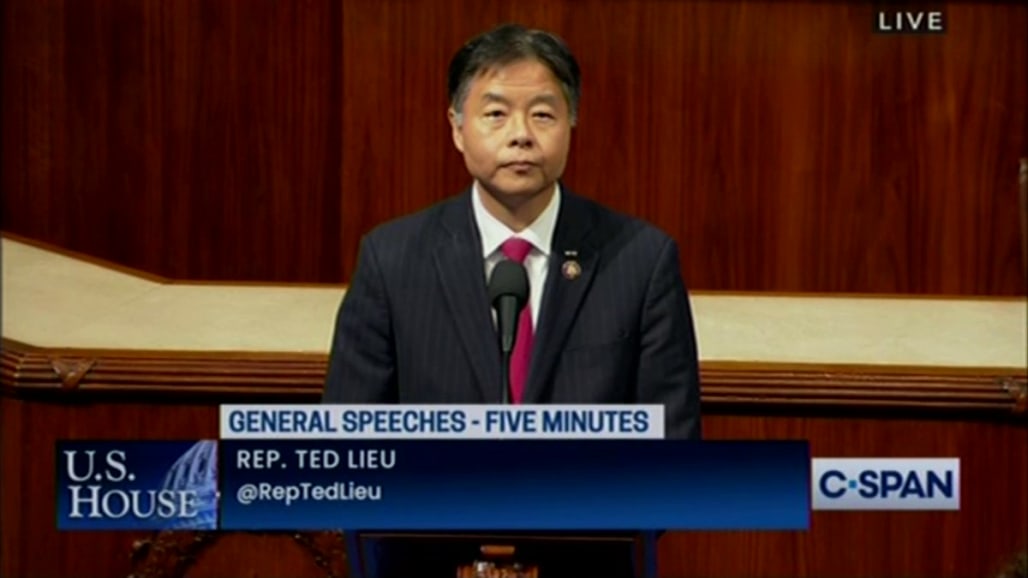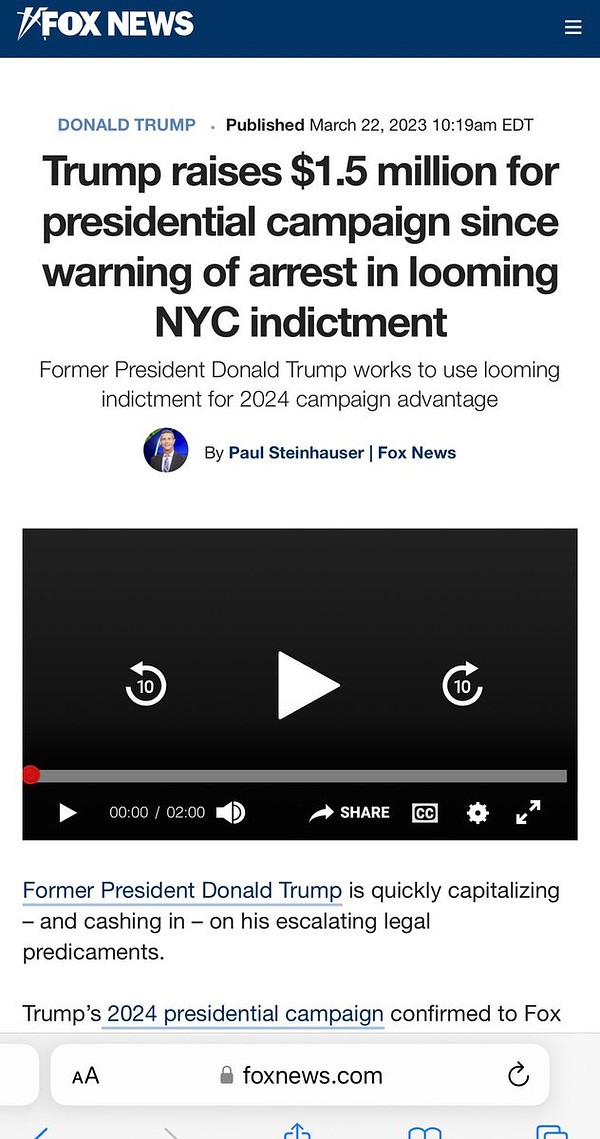This week, news has been focused on the former president’s possible indictment for paying $130,000 in hush money to adult film performer Stormy Daniels to keep quiet about their 2006 affair before the 2016 election. The information currently being thrown about has been shaped by Trump himself and is obviously suspect (among other things, he has apparently raised $1.5 million since he claimed he would be arrested on Tuesday).
Although Republican lawmakers have no more idea than any of the rest of us do what the Manhattan grand jury might have seen, or what charges might be brought against Trump, they have tried to gloss over the scandal by claiming it is about a non-disclosure agreement or that it happened seven years ago or that its investigation is “a political witch hunt perpetrated by one of the far left radical socialist district attorneys,” as Representative Elise Stefanik (R-NY) said. But as journalist Aaron Rupar and Noah Berlatsky explained today in Public Notice, the payment was a big deal in the larger scheme of American democracy.
Trump bought Daniels’s silence because he was willing to break laws in order to get elected. Then–Trump fixer Michael Cohen paid Daniels for her story in exchange for a non-disclosure agreement. Cohen testified that he paid her through a shell company to keep Trump’s connection to the payment hidden. Then Trump reimbursed Cohen for “legal fees.”
That’s a problem with regard to business filings and tax fraud. It is also a problem for the campaign finance laws intended to protect clean elections. Cohen’s payment was a contribution to the Trump campaign because it was made “in order to influence the 2016 presidential election.” The payment was intended to make sure voters didn’t hear another sex scandal in October 2016, just after the Access Hollywood tape came out in which Trump talked vulgarly about sexually assaulting women, when it might have hurt his chances at election. The $130,000 contribution was far above the individual limit of $2,700, and the Trump campaign did not disclose it.
This is not small potatoes. When the issue came to light, Cohen pleaded guilty for his role in the payments, and he was sentenced to three years in prison. Cohen testified that he made the payments at Trump’s direction.
This is also not an isolated incident. Trump has proved himself more than willing to cheat to win elections. In the 2020 presidential election season, before he tried to overthrow the election altogether, he tried to strong-arm Ukraine president Volodymyr Zelensky into announcing an investigation into the son of the Democratic candidate about whom he was most worried: Joe Biden. Trump knew that the media would run with an announcement of an investigation, wounding Biden’s candidacy by keeping the story in the news even without any real investigation behind it.
The Trump campaign had done much the same thing in 2016. According to the Republican-led Senate Intelligence Committee, which investigated the ties between the Trump campaign and Russian operatives, Trump’s people were willing at the very least to work alongside Russian operatives to weaken Trump’s Democratic opponent, Secretary of State Hillary Clinton. The Trump campaign also boosted Trump’s standing in the 2016 election season with the recurring refrain of the investigation into Secretary Clinton’s emails, convincing voters—falsely—that she had committed crimes.
The pending issue of the hush-money payment is not just about 2016, and it is not just about Trump. That today’s Republican leaders have not condemned any of his attempts to cheat speaks volumes about the party. As Representative Ted Lieu (D-CA) pointed out today, when “Cohen was arrested, indicted, convicted, and went to prison for participating in an illegal hush money payment scheme to Stormy Daniels, not a single Republican leader complaining now said a thing about what happened to Michael Cohen.” So why the rush to defend Trump in the same case?
It appears Republicans have gotten to the point that they don’t believe they can win a free and fair election, and in their conviction that Democrats will destroy the country, they believe cheating to win is justified. They cannot condemn Trump because he delivered what they wanted: a victory.
In a democracy, the way parties are supposed to win elections is by making a better case for being in power than their opponents do. Losing elections is supposed to make leaders think deeply about how better to appeal to voters. That system keeps all parties constantly honing their policies, thinking through problems, benefiting their constituents.
Our election laws are designed to try to hold the playing field level, and a party should want to keep the system fair in order to keep itself healthy. But if a party is willing to cheat to win, it no longer has to work on policies that appeal to voters; it can simply game the system to dismantle the competition on which democracy depends and instead create a one-party state.
There are many legal problems in Trump’s front yard these days. Some, like his theft of documents with markings bearing the highest level of classification and his attempt to overturn the Georgia results for the 2020 presidential election, are heating up fast, and their significance is clear.
But for all that the case we are currently hearing so much about seems less serious on its face than the other things charged to Trump's account, a hush-money payment to silence someone whose story might have affected the 2016 election is no laughing matter.
—
Notes:






Let's not go back to all Trump, all the time. If we give him oxygen his notoriety wins votes, unfortunately. He will be indicted or not. Our job is to elect Democrats to keep the MAGA cult out of power.
The moral for all of us ordinary citizens is that we need to vote. We need to work on voter registration, on getting out the vote on election day, and on voting ourselves. We need to elect legislators who will protect everyone's right to vote, since that's the basis of our democracy. We need to elect judges or those who appoint judges who will make sure that everyone is equal before the law. It is up to all of us to do the work of ensuring that scoundrels and cheats cannot prevail.